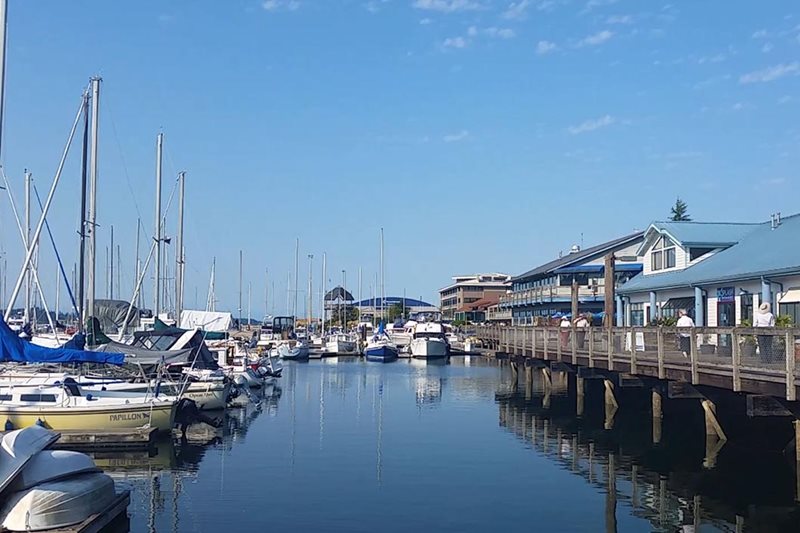EPA Vessel General Permit
From commercial fishing to transporting cargo, vessels are an essential part of Washington's economy. Vessels can contribute to marine pollution which affects aquatic life. Some pollutants can be carried up the food chain to the fish that people eat. Pollution prevention has been targeted under the EPA Vessel General Permit.
This is a permit administered by the U.S. Environmental Protection Agency (EPA). It allows incidental discharges into waters of the United States from commercial vessels greater than 79 feet in length and for ballast water from commercial vessels of all sizes.
We include this information on our website to provide guidance to help you understand and implement your permit in Washington; however, we do not issue the permit. Find more information by visiting EPA's Vessel General Permit website.
The current EPA permit went into effect Dec. 19, 2013, and expires Dec. 18, 2018. This permit has been administratively extended; please see below for more information.
Puget Sound is now a
No Discharge Zone
See our No Discharge Zone webpage for more information and pumpout station locations.
Permit documents
- Current permit
- Additional state requirements to the EPA Vessel General Permit start on page 134 of the current permit.
- Change, implement, and comply with your permit using information from the EPA
- Previous permit
Vessel Incidental Discharge Act causes changes to permits
The Vessel Incidental Discharge Act (VIDA) signed into law on Dec. 4, 2018, establishes a new structure for regulating vessel incidental discharges under the Clean Water Act. VIDA’s purpose is to create uniform national standards. The EPA administers the law and the United States Coast Guard (USCG) enforces it.
Under VIDA, the current 2013 Vessel General Permit (VGP) will remain in full effect until EPA publishes performance standards and then the Coast Guard finalizes implementation regulations. Until VIDA language is finalized, commercial vessels greater than 79 feet in length must continue to comply with all 2013 VGP requirements. Fishing vessels of any size and all vessels less than 79 feet in length must only comply with the 2013 VGP ballast water requirements.
Who does this apply to?
- All commercial vessels greater than 79 feet length
And ballast water from:
- All fishing vessels (any size)
- Commercial vessels less than 79 feet length
Where does this apply to?
- VGP requirements generally extend three nautical miles from shore.
- The state constitution says state waters extend to Canadian marine waters at the 49th parallel.
See contact information below if you have further questions if this applies to your vessel.
What if I had a Small Vessel General Permit?
With VIDA signed into law, the Small Vessel General Permit is repealed, effective immediately. All existing Small Vessel General permits are automatically terminated, and no follow-up is needed for permittees.
If you have a vessel less than 79 feet in length (i.e., small vessels), or a commercial fishing vessel (except for ballast water) you are no longer required to have National Pollutant Discharge Elimination System (NPDES) permit coverage. Any vessel discharging ballast water must comply with the ballast water requirements in the Vessel General Permit
Applicable BMP and other guidance
Even though the Vessel Incidental Discharge Act (VIDA) was signed into law, Ecology still enforces RCW 90.48, protecting Washington waters from pollution. Dischargers in Washington are required to follow the Best Management Practices (BMPs) from both the Vessel General Permit and small Vessel General Permit. For discharges from small vessels and fishing vessels of any size (not ballast water), refer to BMPs below. In the tables below, we have referenced the section and page number in the permit for a particular discharge type for your convienence.
Additional requirements for compliance with state regulations and implementation guidance
Apply
- 300 tons or more.
- Can hold or discharge more than eight cubic meters of ballast water.
Permit Authorization and Record of Inspection form for vessels:
- Less than 300 tons.
- Cannot hold or discharge more than eight cubic meters of ballast water.
Contacts for assistance
Ryan Albert
202-564-0763
Robin Danesi
202-564-1846
CommercialVesselPermit@epa.gov
Tara Martich
907-721-6592
martich.tara@epa.gov
Water Quality Program
Christopher Dudenhoeffer
Whole Effluent Toxicity (WET) Lead
Christopher.Dudenhoeffer@ecy.wa.gov
360-407-6445
Spills Program
Sean Orr
Sean.Orr@ecy.wa.gov
360-407-7420
Allen Pleus
Aquatic Invasive Species Program (including ballast water and ship/boat hulls)
Allen.Pleus@dfw.wa.gov
360-902-2724
Related links
Contact information
Christopher Dudenhoeffer
Permit coordinator
chris.dudenhoeffer@ecy.wa.gov
360-407-6445


